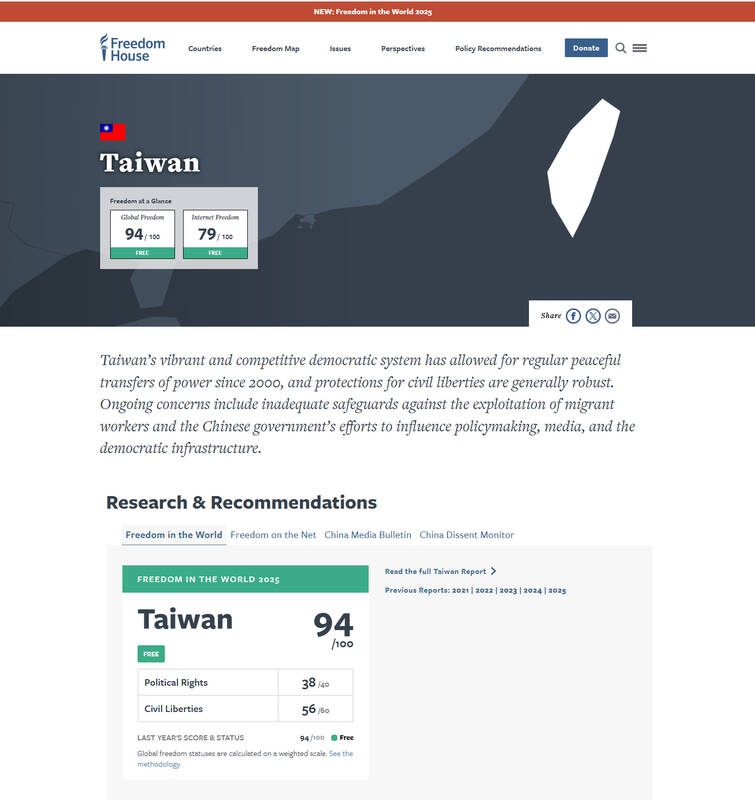Taiwan maintained its status as a “free” country in the latest edition of the Freedom in the World report released yesterday.
With 94 points, Taiwan ranked second in Asia for freedom, the US advocacy group said.
The report, Freedom in the World 2025: The Uphill Battle to Safeguard Rights, said that global freedom declined for the 19th consecutive year due to “political violence and manipulation of elections, ongoing armed conflicts and deepening repression.”

Screengrab from www.freedomhouse.org
The report assesses political rights and civil liberties around the world, providing numerical ratings and descriptive evaluations for each country and region.
This year’s report covers developments in 208 countries and regions from Jan. 1 to Dec. 31 last year.
Last year, “60 countries experienced declines in their political rights and civil liberties, while only 34 registered improvements,” the report said.
The report called for everyone who values democracy to work together to defend it in the coming year.
Election-related violence was a major issue, occurring in 40 percent of the 66 places that held national elections last year, it said.
“Candidates were attacked in at least 20 countries, while polling places were attacked in at least 14,” the report said.
“Taiwan’s vibrant and competitive democratic system has allowed for regular peaceful transfers of power since 2000, and protections for civil liberties are generally robust,” Freedom House said on its Web site. “Ongoing concerns include inadequate safeguards against the exploitation of migrant workers and the Chinese government’s efforts to influence policymaking, media and the democratic infrastructure.”
Taiwan’s score of 94 was the same as last year, with 38 out of 40 points in political rights and 56 out of 60 points in civil liberties.
This classifies Taiwan as a “free” country, ranking second in Asia behind Japan, which scored 96 points.
Freedom declined around the world last year with authoritarians solidifying their grip, but South Asia led a series of bright spots, Freedom House said.
The Washington-based group elevated two countries to the status of “free” — Senegal, where the opposition triumphed after the outgoing president’s attempt to delay elections was defeated, and Bhutan, the Himalayan kingdom, which consolidated a transition to democracy with competitive polls.
Bhutan gained the distinction of being the only South Asian country classified as free, while others in the region such as Bangladesh and Sri Lanka made strong gains in the index without changing categories.

FREEDOM OF NAVIGATION: The UK would continue to reinforce ties with Taiwan ‘in a wide range of areas’ as a part of a ‘strong unofficial relationship,’ a paper said The UK plans to conduct more freedom of navigation operations in the Taiwan Strait and the South China Sea, British Secretary of State for Foreign, Commonwealth and Development Affairs David Lammy told the British House of Commons on Tuesday. British Member of Parliament Desmond Swayne said that the Royal Navy’s HMS Spey had passed through the Taiwan Strait “in pursuit of vital international freedom of navigation in the South China Sea.” Swayne asked Lammy whether he agreed that it was “proper and lawful” to do so, and if the UK would continue to carry out similar operations. Lammy replied “yes” to both questions. The

‘OF COURSE A COUNTRY’: The president outlined that Taiwan has all the necessary features of a nation, including citizens, land, government and sovereignty President William Lai (賴清德) discussed the meaning of “nation” during a speech in New Taipei City last night, emphasizing that Taiwan is a country as he condemned China’s misinterpretation of UN Resolution 2758. The speech was the first in a series of 10 that Lai is scheduled to give across Taiwan. It is the responsibility of Taiwanese citizens to stand united to defend their national sovereignty, democracy, liberty, way of life and the future of the next generation, Lai said. This is the most important legacy the people of this era could pass on to future generations, he said. Lai went on to discuss

MISSION: The Indo-Pacific region is ‘the priority theater,’ where the task of deterrence extends across the entire region, including Taiwan, the US Pacific Fleet commander said The US Navy’s “mission of deterrence” in the Indo-Pacific theater applies to Taiwan, Pacific Fleet Commander Admiral Stephen Koehler told the South China Sea Conference on Tuesday. The conference, organized by the Center for Strategic and International Studies (CSIS), is an international platform for senior officials and experts from countries with security interests in the region. “The Pacific Fleet’s mission is to deter aggression across the Western Pacific, together with our allies and partners, and to prevail in combat if necessary, Koehler said in the event’s keynote speech. “That mission of deterrence applies regionwide — including the South China Sea and Taiwan,” he

UNPRECEDENTED: In addition to the approved recall motions, cases such as Ma Wen-chun’s in Nantou are still under review, while others lack enough signatures The Central Election Commission (CEC) announced yesterday that a recall vote would take place on July 26, after it approved the first batch of recall motions targeting 24 Chinese Nationalist Party (KMT) lawmakers and Hsinchu Mayor Ann Kao (高虹安). Taiwan is in the midst of an unprecedented wave of mass recall campaigns, following a civil society push that echoed a call made by Democratic Progressive Party (DPP) caucus whip Ker Chien-ming (柯建銘) in January to initiate signature drives aimed at unseating KMT legislators. Under the Civil Servants Election and Recall Act (公職人員選舉罷免法), Taiwanese can initiate a recall of district-elected lawmakers by collecting